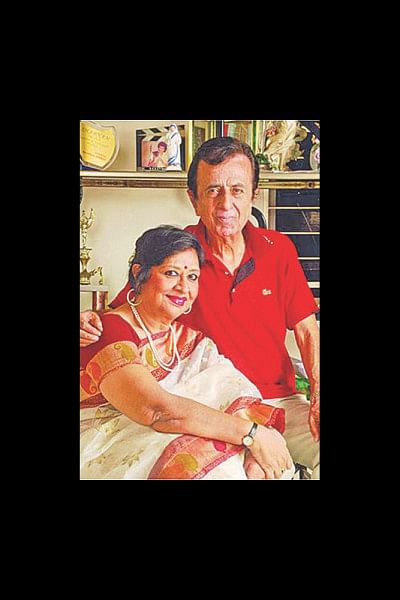Oh Robin Ghosh!

It was even before Robin Ghosh had married film actress Shabnam. Shabnam's original name is Jharna Boshak, and I called her Jharna Auntie. She was wearing a plain coloured maroon sari as someone opened the door of our living room in our Purana Paltan house. She had come to meet my aunt, Ferdausi Rahman, reigning queen of playback. Loving as Jharna Auntie is, she took me upon her feet and let me swing like a yoyo. As my aunt entered, they sat down for consultations about the songs. Robin Ghosh entered the scene, a young Robin Ghosh in the early sixties, sitting down with Ferdausi and jointly producing songs like 'Tomare legeche eto je bhalo', an everlasting song of love, sensitivity, and romanticism, sung by Talat Mahmud, which has inspired many others to make reproductions.
This was the Bangla film 'Rajdhanir buke' and I remember their long hours of working together in the first floor verandah of Hiraman Manzil (our house) named after Abbasuddin Ahmed's mother. My grandfather's loving plants, specially the night jasmine, still surrounded the verandah, as he had only recently left us for his final abode (1959). I witnessed my Aunt blossoming into the darling of the playback world. My grandmother cooked and served as Robin Ghosh tuned the songs. 'Ami rupnogorer rajkonna' became a super hit song with Shabnam dancing, Ferdausi Rahman singing the tunes by Robin Ghosh. This collaboration brought out the best songs in the 60s, songs that have dominated our music scene and can be compared to international standards. I watched them collaborate; such a beautiful memory to look back upon. Movies like Talash (1963) with super hit songs like 'Kuch apni kahiye' were sung by Ferdausi and Basheer Ahmed (both separately). Earlier Ferdausi's song 'Ankhiyaan tori rah nehari' from the film Chanda became a super hit, the other songs being 'Aji mein ne kaha salaam walekum' or 'Khanak jaye re' (Chakori). Ferdausi reminisced how Robin Ghosh taught her various simple techniques which had a unique effect in changing the song. Recently, in one reality show in an Indian channel, singer Kavita Krishnamurty demonstrated such techniques which had been taught to her by R. D. Burman. Robin Ghosh had similar mentoring skills.
Until 1968, Ferdausi Rahman sang the lion share of the songs composed by Robin Ghosh, with most of them becoming super hit numbers. 'Tum bhi hasin hum bhi jawan', "Mein to nachu cham..' (1964), and later, in Chakori (1967), 'Kabhi to tum ko', 'Woh mere samne'. In between, there were films Beguna, Bhayya (1966) all of which hit the box office. In 1972, Runa Laila sang for his film 'Ehsas' and so did Mehdi Hassan with 'Aap ka husne jo dekha' to 'Khuda yaad aye'. Followed by movies 'Sharafat Bhool, Miss Hippi'. In film Sharafat, Runa Laila's song 'Duniya ki sharafat' and others became very famous. Ahmed Rushdi sang a chunk of the songs from West Pakistan, so did Akhlaq Ahmed and other singers Nahid Niazi, Shenaz Rahmatullah, Nayyara Noor, Mehnaz, Alamgir, Basheer Ahmed, Mala and Masood Rana. 'Pyar bhare do sharmile nayn' was sung by Mehdi Hassan in film Chahat (1974). The tune haunts us as it is immortal. The movie 'Aina' in 1977 brought the hit song by Mehdi Hassan 'Mujhe dil se na bhulana' and Nayyara Noor's famous song 'Roothe ho tum, 'Tumko kayse manau piya', 'Bolona bolona'.
Other movies include Jahan Tum Wahan Hum (1967), Tum Mere Ho (1968), Dagh (1969), Do Sathi (1975), Umang (1975), Anokhi (1976), Jio Aur Jeene Do (1976), Mom Ki Guriya (1976), Anmol Mohabbat (1978), Ambar (1978), Bandish (1980), Do Paysay , Nahin Abhi Nahin, Ahaat (1982), Kiran Aur Kali, Bheegay Badan, Hum Aur Tum, Sheesh Nagin (1988), Jo Dar Gya Woh Mar Gya (1995).
Robin Ghosh had tuned 143 songs from 1962 to 1995.
Robin Ghosh, always impeccably dressed (often in off- white suit), always a gentleman, soft spoken, punctual and attentive. The tunes were so lilting, sensitive, sensuous, and emotional and have left an everlasting impact. How can he die? The songs remain and so does he, in our hearts.
The writer is an academic, Nazrul exponent and writer.

 For all latest news, follow The Daily Star's Google News channel.
For all latest news, follow The Daily Star's Google News channel. 



Comments